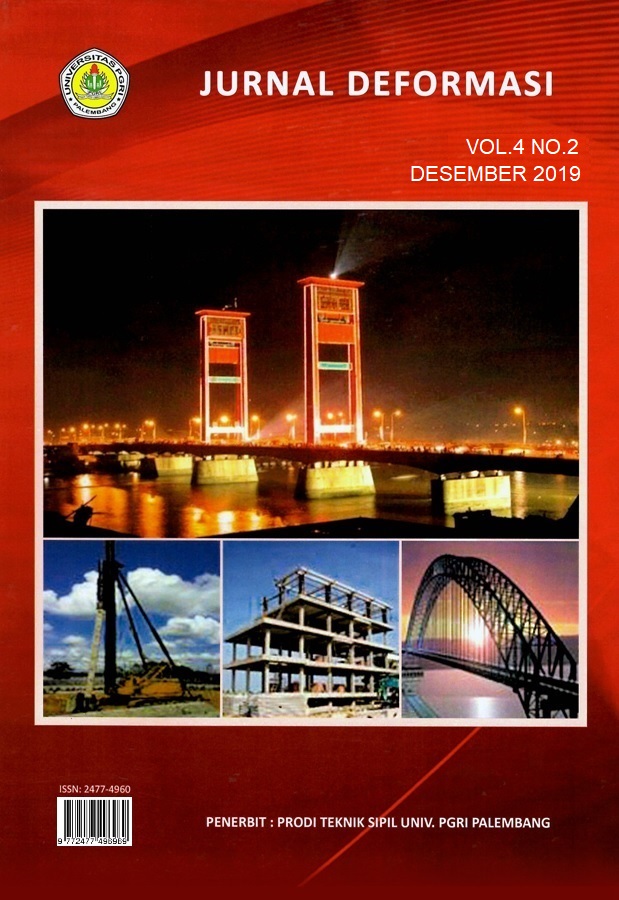PENGARUH WAKTU CURING TERHADAP STABILITASI TANAH DASAR LEMPUNG MENGGUNAKAN POLIMER
DOI:
https://doi.org/10.31851/deformasi.v4i2.3556Abstract
ABSTRAKTanah lempung lunak tersebar di beberapa wilayah di Indonesia. Umumnya, tanah lempung lunak sifat mekanik yang buruk sehingga tidak cocok digunakan sebagai tanah dasar. Stabilisasi terhadap lapisan tanah dasar untuk pembangunan jalan merupakan salah satu solusi untuk mengatasi masalah yang terjadi pada tanah lunak. Polimer adalah bahan tambah masih dikembangkan untuk stabilisasi tanah dasar di Indonesia. Polimer memiliki potensi menggantikan semen dan kapur sebagai bahan tambah tradisional. Pada penelitian ini akan dibahas mengenai pengaruh waktu curing terhadap sifat fisik tanah dan sifat mekanik tanah dasar yang distabilisasi oleh polimer bila dibandingkan dengan tanah asli. Benda uji diperam selama 2, 4, 6, 9, 18, 24, 48,72 jam dan 7 hari. Hasil penelitian menunjukkan adanya perbaikan dengan menurunnya nilai indeks plastisitas dan kadar air. Nilai kuat tekan bebas mengalami kenaikan sebesar 10% setelah di lakukan pemeraman selama 7 hari.Kata Kunci : Tanah dasar, waktu curing, polimer, indeks plastisitas, kuat tekan bebasReferences
Sauceda M., Johnson D.W., Huang J., Shafique S.B., Sponsel V.M., and Appleford M., 2014, Soil-Strength Enhancements from Polymer-Infused Roots, Journal of Geotechnical and Geoenvironmental Engineering, vol.140
Moustafa A.B., Bazaraa A.R., and Nour El Din A.R., 1981, Soil Stabilization by Polymeric Materials, Macromolecular Materials and Engineering, vol.97.
Georgees R.N., Hassan R.A., Evans R.P., and Jegatheesan P., 2018, Resilient Response Characterization of Pavement Foundation Material Using a Polyacrylamide-Based Stabilizer, ASCE Journal of Materials in Civil Engineering, vol.30, no.1.
Rodriguez A.K., Ayyavu C., Iyengar S.R., Bazzi H.S., Massad Eyad., Little Dallas., and
Hanley Howard J.M., 2018, Polyampholyte Polymer As a Stabiliser for Subgrade Soil, International Journal of Pavement Engineering, vol.19,no. 6, pp. 467-478.
Kolay P.K., Dhakal B., Kumar S., and Puri V.K., 2016, Effect of Liquid Acrylic Polymer on Geotechnical Properties of Fine-Grained Soils, International Journal of Geosynthetic
and Ground Engineering.vol.2,no.29.
Naeni S.A., Naderinia B., and Izadi E., 2012, Unconfined Compressive Strength of Clayey Soils Stabilized with Waterborne Polymer, KSCE Journal of Civil Engineering, vol.
,no. 6, pp. 943-949.
Ates, 2013, The Effect of Polymer-Cement Stabilization on the Unconfined Compressive Strength of Liquefiable Soils, International Journal of Polymer Science.
ASTM D2216-98, 2010, Standard Test Method for Laboratory Determination of Water (Moisture) Content of Soil and Rock by Mass, ASTM International, West Conshohocken, Pennsylvania.
ASTM D854-02, 2010, Standard Test Method for Specific Gravity of Soil Solids by Water Pycnometer, ASTM International, West Conshohocken, Pennsylvania.
ASTM D422-63, 2010, Standard Test Method for Particle-Size Analysis of Soils, ASTM International, West Conshohocken, Pennsylvania.
ASTM D4318-00, 2010, Standard Test Method for Liquid Limit, Plastic Limit, and Plasticity Index of Soils, ASTM International, West Conshohocken, Pennsylvania.
ASTM D698-12e2, Standard Test Methods for Laboratory Compaction Characteristics of Soil Using Standard Effort (12 400 ft-lbf/ft3 (600 kN-m/m3)), ASTM International, West Conshohocken, PA, 2012.
ASTM D2166-00, 2010, Standard Test Method for Unconfined Compressive Strength of Cohesive Soil, ASTM International, West Conshohocken, Pennsylvania.
ASTM D2487-00, 2010, Standard Practice for Classification of Soils for Engineering Purposes (Unified Soil Classification System), ASTM International, West Conshohocken, Pennsylvania.
AASHTO M145-91, 1991, Standard Specification for Classification of Soils and SoilAggregate Mixtures for Highway Construction Purposes, AASHTO Officials, Washington DC.
ASTM D2488-00, 2010, Standard Practice for Description and Identification of Soils (Visual-Manual Procedure), ASTM International, West Conshohocken, Pennsylvania.
Iyengar S.R., Masad E., Rodriguez A.K., Bazzi H.S., Litte D., and Hanley H.J.M., 2013, Pavement Subgrade Stabilization Using Polymers: Characterization and Performance, ASCE Journal of Materials in Civil Engineering, vol.24, no.4, pp. 472-483
Naeni, S.A., and Ghorbanalizadeh, M., 2010, Effect of Wet and Dry Conditions on Strength of Silty Sand Soils Stabilized with Epoxy Resin Polymer, Journal of Applied Sciences, vol.10, no.22, pp. 2839-2846.
Wilkinson, A., Haque, A., and Kodikara J., 2010, Stabilisation of clayey soils with industrial by-products:part A, Proceedings of the Institution of Civil Engineers Ground Improvement, Issue G13, pp. 149-163.
Timoney, M.J., McCabe B.A., and Bell A.L., 2012, Experiences of dry soil mixing in highly organic soils, Proceedings of the Institution of Civil Engineers Ground Improvement, vol.165, pp. 3-14.
Downloads
Published
How to Cite
Issue
Section
License

Authors retain copyright and grant the journal right of first publication with the work simultaneously licensed under a Creative Commons Attribution-NonCommercial-ShareAlike 4.0 International License that allows others to share the work with an acknowledgement of the work's authorship and initial publication in this journal.



.png)
.png)


